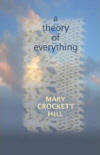a theory of everything
This boldly titled collection is split into cleverly named sections, such as “everything before us,” “in spite of everything,” and “the end of everything,” so that we immediately get the impression that we will be taken through a giant landscape of image and emotion. However, we are misled in the scope; the landscape presented is largely personal, the everything particular to her universe. The titular poem suggests she will relate the universe to ourselves, not that the universe (or perhaps more specifically, string theory) is a metaphor for our lives, which is perhaps more the case with these poems.
This boldly titled collection is split into cleverly named sections, such as “everything before us,” “in spite of everything,” and “the end of everything,” so that we immediately get the impression that we will be taken through a giant landscape of image and emotion. However, we are misled in the scope; the landscape presented is largely personal, the everything particular to her universe. The titular poem suggests she will relate the universe to ourselves, not that the universe (or perhaps more specifically, string theory) is a metaphor for our lives, which is perhaps more the case with these poems.
That said, the poems are quite good, full of curious, self-aware observations that escape the notice of most people. And perhaps most impressively, Hill keeps the heart front and center, able to render her questions emotional without pathos or sentimentality. The lead poem uses a casual, wondering tone to achieve this:
I also believe it has something to do with dogs.
For who else has such capacity to forgive
an entirely other species? Well, yes, God
but I don’t mess around with God.
So in my theory, the wet nose of a dog
fits in the space where our heart has been cut out.
The simpler poems are really the strongest here, able to get their points and emotions through clearly. Hill has a good sense for rhythm, and the shorter poems allow her various effects to reinforce the meaning. Consider:
Must we flap our way windward – feathers
whirling like confetti, always muscle, always straining, always
honk, honk, honk, honk?
These poems also allow her stand-out lines to well, stand out. A few examples include, “love for babies is a stout brown goose rife with worry,” “the careless abundance of orange,” and “let all this suffering be about something / other than suffering or math.”
The poems that feature longer lines and denser imagery allow Hill to mull some interesting ideas and places. Body odor, the welfare of fleas, how to extend charity to crazy people – these are all engaging enough, but the turns at the end fall a little flat, lacking a sufficiently strong cognitive echo. Take the end of one such poem, “and above, a speckled bird / holds whatever she’s forgotten in the dusk of his ruby red throat.” It holds most of the hallmarks of a good ending, but it just doesn’t quite work. Perhaps it’s the surfeit of r’s, or that the line runs the same length as the preceding ones, but in the end it fails to engage us, to digest the perspective she has labored for.
However, the best of these longer ones does manage to bring it all together. In “Wes,” we have some good single lines, a well-paced recounting of events, but most importantly, a genuine strangeness that distorts what should be a normal encounter into something that touches us beyond expectation. It helps that the last lines work: “‘You have everything here. Everything.’ / And I can’t help thinking, what in the world could he mean?”
This question captures the fundamental essence of these poems that search for a frame of reference that might answer a rather perplexing life. It is a shame that, like many poets who appeal to science metaphors, the full potential is not reached. For example, “Newton’s Cradle” highlights the presence of these toys on rich men’s desks, with no nuance of oppositional forces or sublimation. It is hard to find the theory of everything when you can’t see the connections.
Still, a theory of everything is very good work, full of direct, interesting poems. The main shortcoming is only one of ambition. Perhaps she lost sight of the global structure in compiling the poems, or merely overstretched in the title and introduction. Either way, Mary Crockett Hill’s latest collection is well worth reading, and I look forward to her next book delivering fully.





